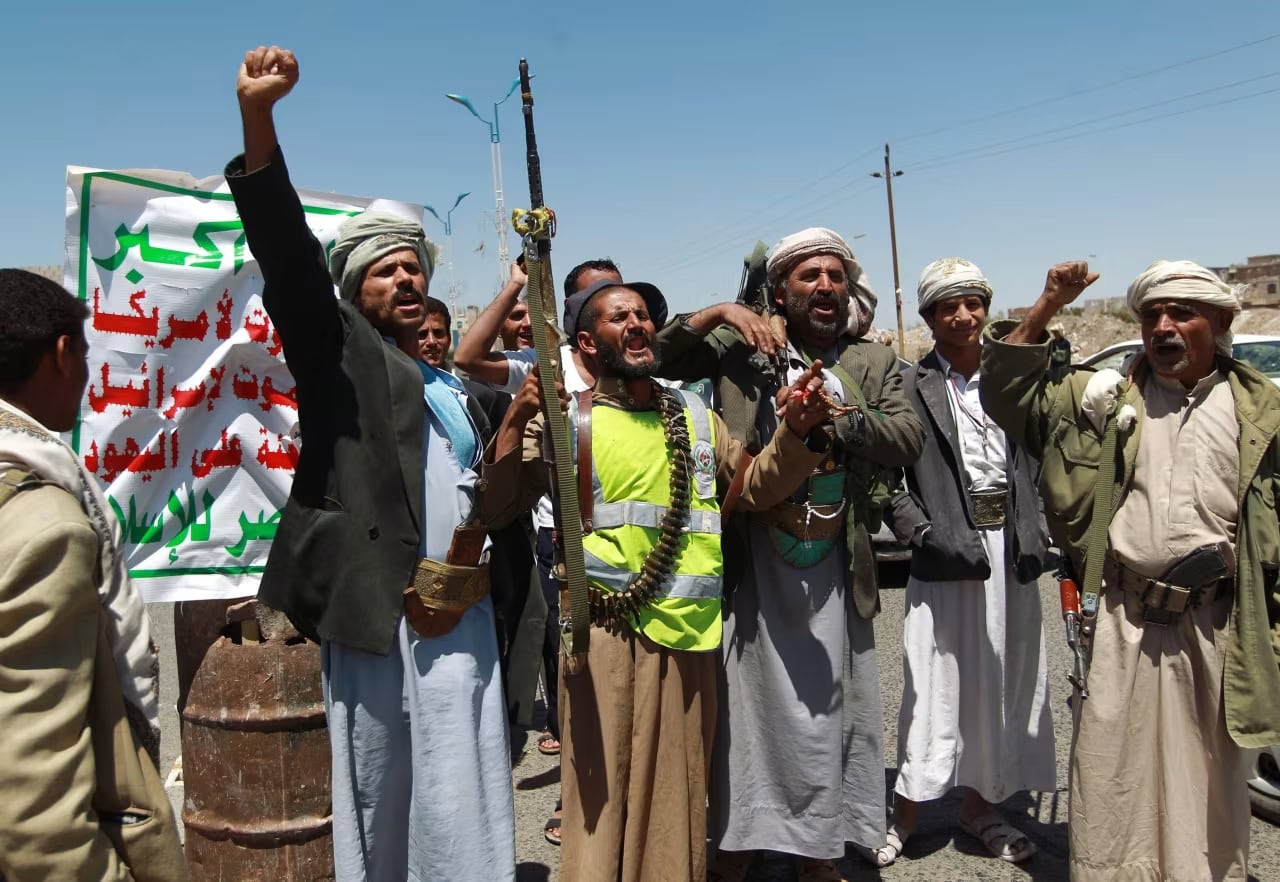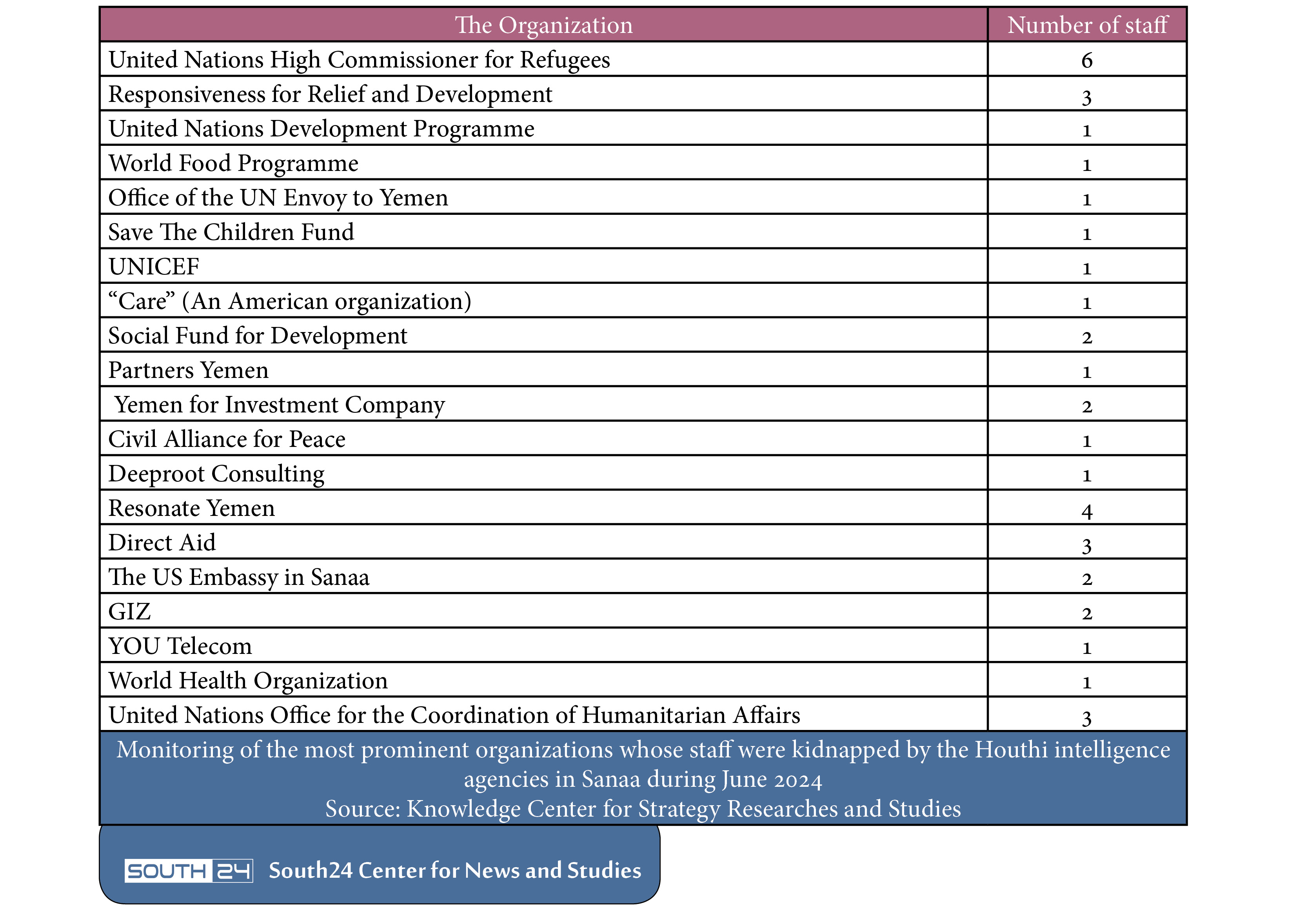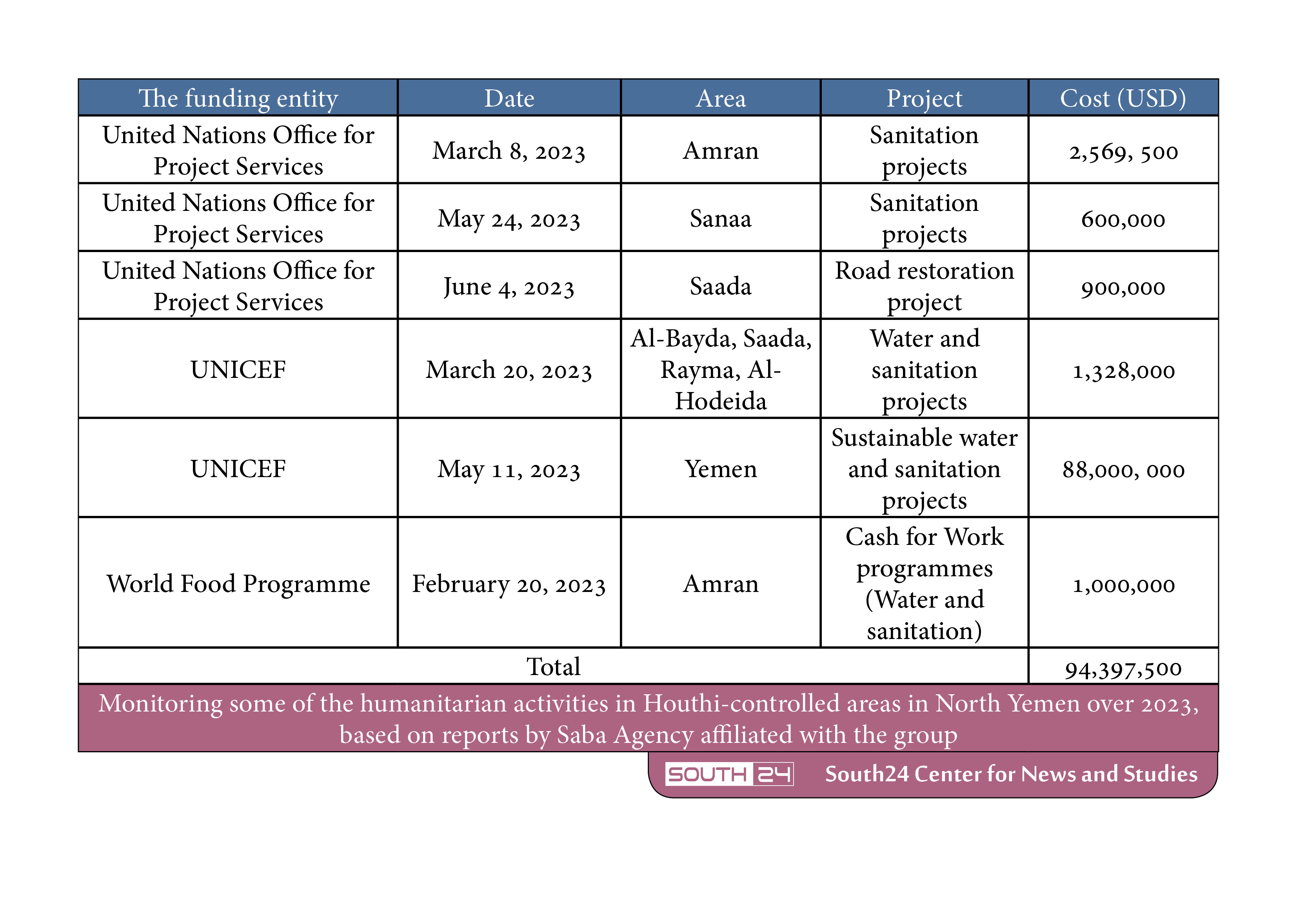
Credit: afp/getty images
25-06-2024 الساعة 1 مساءً بتوقيت عدن
These developments have raised concerns about their ramifications on international humanitarian activities in war-stricken Yemen, where millions of people suffer from extreme poverty.
Abdullah Al-Shadli (South24)
On June 6, the Iran-backed Houthi militia launched a kidnapping campaign against employees affiliated with the UN and non-governmental organizations (NGOs) as well as former Yemeni staff of the US Embassy in Sanaa.
The UN official statistics point to the arrest of 13 UN staff in addition to five employees of local NGOs during the Houthi operation in places including Sanaa, Al-Hodeida, and Saada.
According to the Ministry of Legal Affairs of the Internationally-Recognized Yemeni Government, more than 50 employees affiliated with the international and local organizations have been kidnapped, including four women, one of whom was arrested with her husband and children.

On June 10, the Houthi intelligence agency announced, in a statement issued by the group’s security wing, that an “American-Israeli espionage network” was arrested in Yemen, and that it has direct links with the CIA.
The Houthi statement didn’t specify the number of people arrested. It alleged espionage and subversive activities by former Yemeni staff in the US embassy as well as the UN and NGOs.
The statement claimed that after the US Embassy left Sanaa in early 2015 the “espionage network” continued its “subversive” activities under the cover of international aid and UN organizations, “raising slogans of humanitarian activities” as a camouflage for their spying.
Via Al-Masirah TV channel, the Houthis broadcast videos of the kidnapped employees, showing the latter making purported confessions that, according to experts and activists, were extracted under pressure and torture. Others said that the confessions condemn the Houthis as they don't prove anything.
On June 11, UN Secretary-General, Antonio Guterres, called on the Houthis to immediately release all detainees.
He said: “This is an alarming development that raises serious concerns about the Houthis’ commitment to a negotiated solution to the conflict. The United Nations condemns all arbitrary detention of civilians. I demand the immediate and unconditional release of all detained UN personnel.”
The Yemeni government called on the UN and international agencies to move their main headquarters to the capital, Aden, to “guarantee a safe and proper environment for their work”.
On June 15, the US, Australia, Canada, New Zealand, and the UK condemned the Houthis for detaining UN staff. In a joint statement, they said: “These arrests represent an escalation by the Houthis, and jeopardize a sensitive peace process.” They added that the arrests are “an affront to international peace and security”.
These developments have raised concerns about their ramifications on the international humanitarian activities in war-stricken Yemen, where millions of people suffer from extreme poverty. Since December 2023, the Houthis’ modus operandi has led to stoppage of the aid delivered by the World Food Programme in the Northern areas that have been under the group’s control since 2015. The Houthis seize cash and food aid, divert funds and supplies to their members, sell relief materials, and use the money to attract and mobilize fighters and finance their wars. The WFP announced in December 2023 that it would suspend programming in areas under Houthi control.
An Important Role
Over the past years, the UN agencies and their local partners have delivered aid as well as health and medical services to wide sectors of Yemenis that has helped to somewhat mitigate the brunt of the humanitarian crisis.
A large part of these international aid efforts has focused on North Yemen, which hosts the biggest population bloc in Yemen and where these agencies have to additionally contend with the Houthi’s non-compliance toward much of their obligations despite being the de-facto authority.
Over the first half of the last year, ‘South24 Center‘ listed projects worth $94 million in the Houthi-controlled areas, funded by three UN bodies, including United Nations Office for Project Services, UNICEF, and the World Food Programme.

At the start of 2024, the UN said that 18.2 million people in Yemen, or more than half of the population, need humanitarian help and protection services.
Expected Ramifications
Yemeni journalist Eyad Al-Sharabi has warned that the latest Houthi acts of detaining aid personnel “will have a disastrous impact on millions of Yemenis who rely upon humanitarian aid delivered by the international organizations”. He told ’South24 Center‘ that “this Houthi strategy will double the suffering of thousands of Yemeni families whose salaries have been looted by the Houthis for the past nine years.”
Al-Sharabi believes that the international organizations that have made attempts to get along with the Houthis and work under their control will find themselves today obliged to move their operations and headquarters to Aden.
Marwan Manea Al-Shairy, Head of the Aden Foundation for Rights and Development, believes that the Houthi’s repressive approach reached its zenith during the latest campaign. He told ’South24 Center‘ that the concerns about the aftereffects of the Houthis’ crusade against humanitarian work have deepened more than ever’.
Timing and Indications
Coincidentally, the Houthi’s latest actions came at the time of the economic decisions issued by the Aden-based Yemeni government. These include decisions by the Yemeni Central Bank to move the commercial banks’ main headquarters from Sanaa to Aden. This is in addition to transferring all past and future revenue of ’Yemenia Airways’ from Sanaa to the airline's bank accounts in Aden. The Yemeni government also called for moving the offices of the UN agencies and the international organizations to Aden.
Yemeni political researcher and advocate Dr. Khaled Al-Shamiri drew a link between the Houthi’s detention of UN staffers and aid workers and the Yemeni government's latest economic measures.
He told ’South24 Center: “On one hand, there are external factors, represented in the Houthi response to the American measures that aim to pressure them, such as the decision to designate them as a terrorist group. On the other hand, there are internal factors related to the decisions by the legitimate government in Aden, such as moving the headquarters of banks from Sanaa to Aden.”
He added: “The Houthis seek to deliver a message that any pressure cards against them by the international community, especially the US, will be confronted with counter cards threatening their interests. These include continuing the attacks on international maritime navigation and imposing restrictions on the UN organizations.”
Al-Shairy believes that these arrests are a Houthi attempt to pressure the international actors. They also aim to thwart Aden's latest economic moves.
Eyad Al-Sharabi agrees with this view, adding that “the Houthis believe that the Yemeni government's decisions are a result of an American greenlight. Therefore, they rushed to amplify their announcement about the American espionage cells and promoted it.”.
He added: “The issue of the espionage cells is a tool for political gains through which the Houthis want to put a stop to these governmental decisions that have delivered a painful blow to them.”
So far, the UN organizations or the NGOs operating in Yemen haven't taken any measures to respond to the kidnapping of their employees by the Houthis. This is despite the fact that the employees face the threat of being prosecuted and receive sentences, including of executions that have been used by the Houthis for years against their opponents.
On June 1, the Criminal Court in Sanaa issued death sentences against 45 persons, including the owner and founder of a commercial company, for spying.